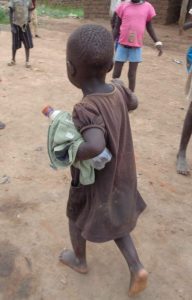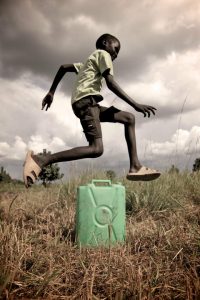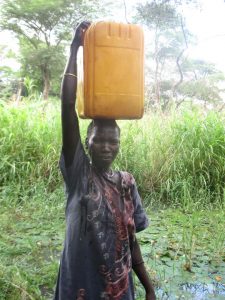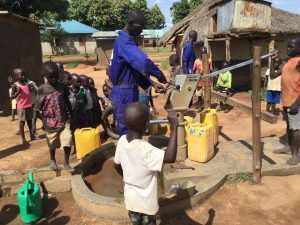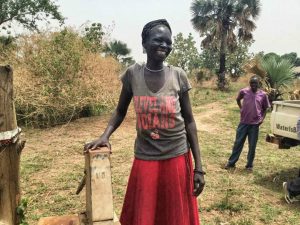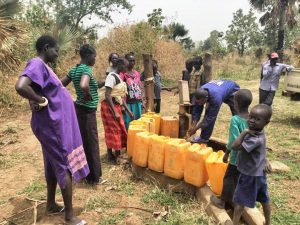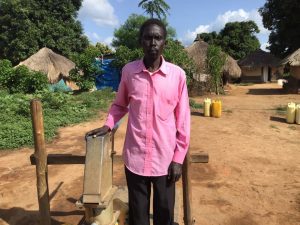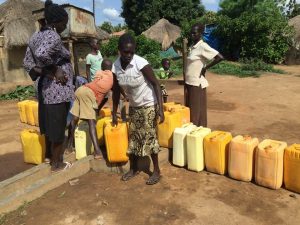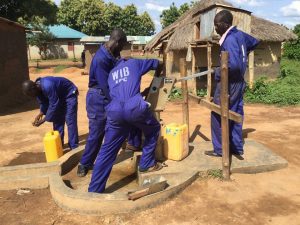South Sudan Well Rehab Program – Phase 3
Sobe Community, Lomuku 2, Lomuku 2 North, Jansuk Community, Equatoria College Community
This project is made possible through the partnership of Water Charity and the National Peace Corps Association, in partnership with Water is Basic, working with Bishop Elias Taban in South Sudan.
We are pleased to report the success of 5 rehabilitated wells in the larger project to restore wells across the country. This page contains project reports and conclusions for all 5 repaired wells in this phase of the South Sudan Well Rehab Program.
Background
The Republic of South Sudan was birthed on July 9, 2011. The newest nation on earth began without paved roads, with few doctors, hospitals or schools, and with an illiteracy rate near 90 percent. This was true nation-building from the basics of water to the intricacies of government and legislation.
In December 2013, conflict ignited between forces of the government and opposition forces leading to the current civil war. Because of this conflict, wells and committees have been abandoned and must be rehabilitated.
In June 2017, Water is Basic, in partnership with His Voice Global and Basic Ministries, helped to cover expenses for a grassroots peace accord mediated by Bishop Elias Taban, Director of Water is Basic South Sudan. He has always been a champion of reconciliation and development in Yei.
Also in attendance was Steve Roese, President of Water is Basic USA, whose long-term presence (12 years) continues to be a great encouragement to those seeking peace in South Sudan.
Water is Basic has been there from the beginning, birthed at the grassroots level, guided by local experience, and implemented by men and women who get what it means to go thirsty. This has given them a seat at the table of peace negotiations between the government of South Sudan and the SPLA-In Opposition, or rebel groups. Water is more than basic and is paving the way to peace.
Project Description
Because of the recent peace initiatives in Yei, many South Sudanese are returning to their communities or making
their way into abandoned villages that are closest to where they have had to resettle. Water Charity, in partnership with Water Is Basic and other organizations, is working to restore wells at a rate of two to three per day, so those that remain and those that are returning will have the basic necessity of clean water.
We are so grateful to our Water Charity donors who have enabled our local Water is the Basic team to complete the restoration of 5 more wells. 475 households are impacted by this work with an estimated 4,750 people gaining access to clean, safe drinking water.
So many of these families have the added burden of trauma with the recent conflict that has been ongoing in Yei and surrounding areas. Many have had to seek refuge in the bush or in neighboring countries in refugee shelters. With peace being realized in Yei, hundreds of people a day are crossing the border into South Sudan from camps in Uganda as they return home. Carrying the weight of trauma coupled with the challenge of coming home to a rusted or broken well is too much for anyone. We are proud of the work that has been completed to allow them the space to heal, to work, to attend school, and to simply live. Clean water changes everything.
The Five Rehabs:
Sobe Community Water Well Restoration
Location
Sobe Community, Yei River State, South Sudan
- 04* 5.648 E. 30* 30* 41.192
Community Description
Sobe Community is multi-ethnic, largely due to the displacement and replacement of individuals from the war. There are over 100 households mainly reliant on farming and small-scale trading. The community cannot afford to purchase water for both domestic and work use. This means they face the daily decision to either use the little water they are rationing to grow better crops to buy more water or to stay hydrated.
Problem Addressed
The Water is Basic/ Water Charity well technicians assessed that the borehole cylinder was damaged as well as some of the rubbers.
Lack of a functional borehole is a huge problem that affects all aspects of village life.
During the time the borehole was broken, community members had to wait hours in line to fetch clean water in the neighboring community. The high costs and time spent waiting in line meant less time to pour into work and education, less time to raise their kids, or do other household tasks.
Most of the committee members of this well are non-Dinka, but the chairman, Mr. Jacob is part of the Dinka tribe. They all respect one another around the well and beyond despite their differences. Mr. Jacob said, “Water is really a symbol of peace and unity.”
Project Impact
The well restored in Sobe Community not only now provides clean water for the men, women, and children, but it will continue to be a source of peace. All who visit the well recognize that they have the same basic needs despite their differences.
This community of over 100 households is now able to use water for both drinking and farming. A restored well also means that those who were displaced from the community because of insecurity and lack of clean water will now be able to return home. And, in fact, since completing this project, the village population has swelled. Naturally, many displaced people opt to settle in villages where there is a consistent source of good water.
Lomuku 2 Water Well Restoration
Location
Lomuku, Yei River State, South Sudan 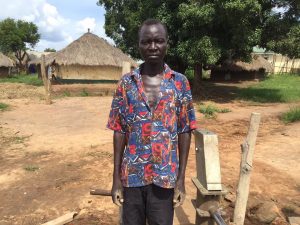
GPS. N. 04* 06.180 E. 30* 40.839
Community Description
Lomuku Two is a community located just outside of the city center of Yei. Most of this community was displaced with the conflict, but over 50 families have recently returned to Lomuku Two.
Problem Addressed
Prior to the conflict, the Lomuku Two borehole was broken for two weeks after the cylinder ring came loose. 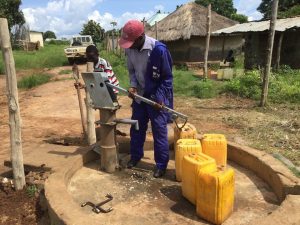 In less than four hours, the Water is Basic crew replaced the well cylinder and connecting rods.
In less than four hours, the Water is Basic crew replaced the well cylinder and connecting rods.
During the conflict, the well was used by many more people than usual as others came to this well from neighboring communities. It was later abandoned when the area became insecure and people there had to seek safety in other areas. From overuse to no usage, the well needed to be restored.
Mr. Thomas Lomoro is now the chairman of the Lomuku Two water well committee. Just before this well was restored, he returned to Lomuku Two from the IDP (Internally Displaced Persons) camp in town. These camps are set up for those that are forced to flee their homes but remain within their country’s borders. He and other committee members were so grateful that the Water is the Basic team that could reach them as many families still fear the area is not secure. Because the Water is a Basic team is a group of local South Sudanese, they are able to reach these areas and understand the weight of the work they are doing. They know because their communities are impacted as well, and they are well aware of what it’s like to go thirsty.
Lomuku Two now has over 50 families that have returned because of the grassroots peace dialogue led by Bishop Taban of Water is Basic. 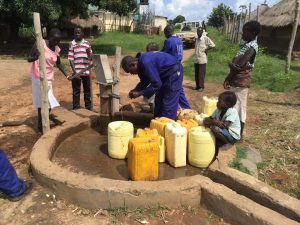
Project Impact
The restored well in Lomuku Two now brings a sense of stability to the 50 families that have returned to the area and is a source of relief to those in neighboring communities who are waiting for their wells to be restored.
A restored borehole means that women and children do not have to seek water from the community water source where expenses are high and often conflict arises. Clean, freshwater in their community means that children in the village are able to refocus their attention on their school work, as they will not have to combat dehydration and waterborne illnesses.
Lomuku 2 North Well Repair Conclusion
Location
Lomuku, Yei Town, Yei River County, Yei State, South Sudan 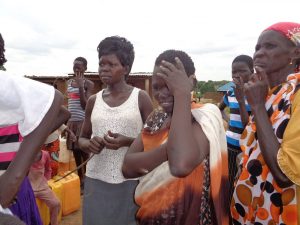
Community Description
Lomuku 2 North is a community located within the city of Yei. The area is lush in the rainy season, but the sun quickly dries the ground and the landscape becomes bare during the second half of the year. It has approximately 500 people, the number fluctuates as refugees flee and return to the village on an almost daily basis.
Problems Addressed
Through Water Charity and Water is Basic, the community borehole that was broken for over two weeks was fixed. The well technicians were able to replace the rusted GI pipes and chain within four hours.
Project Impact
Despite the funds that the community has continued to raise, through the management of the five-member well committee, the prices continue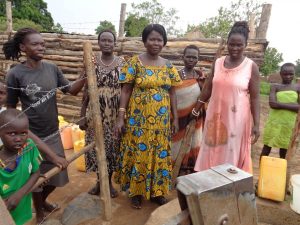 to rise for replacement parts. With assistance from both Water Charity and Water Is Basic, the community has been relieved of the stress of increased costs from marked up water or from health bills and doctor visits.
to rise for replacement parts. With assistance from both Water Charity and Water Is Basic, the community has been relieved of the stress of increased costs from marked up water or from health bills and doctor visits.
Mary Achol, widowed by South Sudan’s internal war, is now a single mother to four boys and a little girl. Even waking up at four in the morning didn’t guarantee Mary access to enough water to support her family. Now, with only a few minutes to get to the borehole, Mary is able to spend more time taking care of her family at home, where she needs to be.
Jenifer is one of the chairs on the committee. She is a strong woman who is beyond appreciative for the assistance in repairing the borehole. She is as determined as ever to get ahead with the community’s collection fees in an attempt to sustain any possible, future repairs.
These committees become a reconciliation tool as mixed genders, tribes and religions work together to manage the community well. By developing a committee, and managing and maintaining their well, the village is able to collect and save money to dedicate to future repairs. In this way, water has become a unifying force in the region. Yei River County and all our recent projects here are an example of this truth in action.
Jansuk Community Water Well Restoration
Location 
Jansuk Community, Yei River State, South Sudan
- 04*06.878 E. 30*39.436
Community Description
Jansuk Community Water Well neighbors Nehemiah Orphanage School. The well provides for households in the community and also serves the staff and children attending the school.
Problem Addressed
Mrs. Asunta Awate is the chairperson of Jansuk Community Water Well. She also works as the head cook at Nehemiah Orphanage School, and is pictured here to the right.
When the borehole stopped working, those in the community had to fetch water from the nearest water hole that was 3.5 miles away. 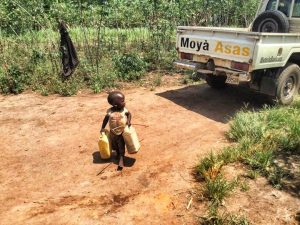 Because the water source was unsanitary, many of the children in the school struggled with dehydration and waterborne illnesses such as typhoid and cholera.
Because the water source was unsanitary, many of the children in the school struggled with dehydration and waterborne illnesses such as typhoid and cholera.
Our well technicians assessed that the galvanized iron pipe (GI pipe) at this borehole had rusted. It took less than three hours to replace this pipe and to ensure that clean fresh water was flowing for this community. This was a simple fix that now means not only health for those in the community, but stability as well. The truth is that a majority of the non-functioning wells around the world are due to relatively minor issues.
The cost of fixing these wells, while not unreasonable, is significantly higher than the cost of maintaining them. For this reason, we make sure the villages implement a Water Use Committee and take steps to make sure regular maintenance is done. The generosity of donors allows us to purchase the necessary materials for our well technicians to properly restore the boreholes and to teach the local people to keep them functional.
Project Impact
A broken well in a community means that children that attend school in the area must either arrive late to school or 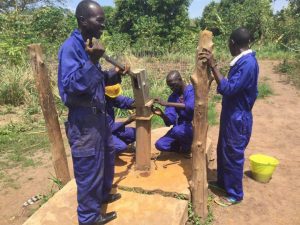 not attend at all. Without clean water, children are severely dehydrated and cannot possibly perform at their best while at school. Household chores and cooking are very difficult and time-consuming without access to clean water at a reasonable distance. Because of this, education for many is not an option.
not attend at all. Without clean water, children are severely dehydrated and cannot possibly perform at their best while at school. Household chores and cooking are very difficult and time-consuming without access to clean water at a reasonable distance. Because of this, education for many is not an option.
The need for water is so great that if a child is old enough to walk with a container of water, they are old enough to fetch water as a daily chore. This restored well means that young children now do not have to walk long, often dangerous, distances for clean water. They are able to spend more of their day focusing on education and other activities.
While women carry the weight of water for their household two to three times per day, the women that work as cooks for the orphanage in Jansuk Community must carry multiple jerry cans in order to cook for the school. This restored well means less work for them, and more food and water for the children.
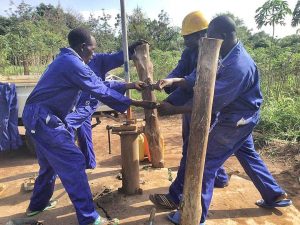
Equatoria College Community Water Well Restoration
Location
Equatoria College Community, Yei River State, South Sudan
- 4*06.223 E. 30*42.502
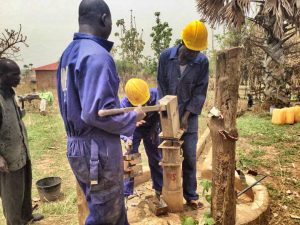
Community Description
This community of 150 households is located 3 miles from the closest town market. The well here serves not only those in the community, but those traveling through as they journey to the market. The source of income for community members here is water well usage fees collected and agriculture.
Problem Addressed
Many boreholes in Yei have recently been abandoned as people have had to leave their homes to seek safety in the bush or in other communities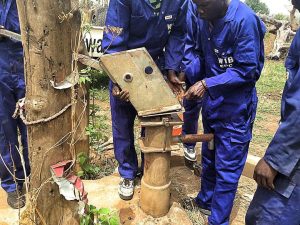 . When wells are not used for long periods of time, GI pipes rust and must be replaced. With this well, the metal bearings were also worn and needed to be replaced.
. When wells are not used for long periods of time, GI pipes rust and must be replaced. With this well, the metal bearings were also worn and needed to be replaced.
Project Impact
Jenti Siama is the chairperson of the well committee in this community. It is the job of women and children to collect water. Therefore, when a committee is formed, it is important that women are included as leaders because they know best the difficulty of walking long distances for water and will do all they can to ensure the well is maintained.
When the Water is Basic team visited this site, some women present at the well were carrying infants, and some were expectant mothers. A jerry can full of water can weigh over forty pounds. These mothers carry more of a burden than anyone should have to endure. The strain of carrying the heavy container three times a day has caused many expectant mothers to miscarry.
It’s not only the women but also their children that often have to make multiple trips a day to water sources that eventually make them sick. This working 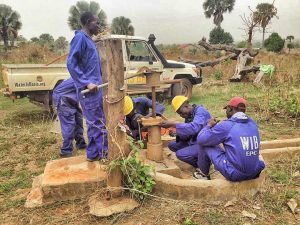 borehole means children do not have to make the arduous, often dangerous, walk to water. Their focus can instead be on education; a way forward to a brighter future for them.
borehole means children do not have to make the arduous, often dangerous, walk to water. Their focus can instead be on education; a way forward to a brighter future for them.
Because of the recent conflict, humanitarian organizations had to pull out of the area. Jenti Saima was surprised and overjoyed that the Water is Basic crew was able to come visit them to restore their well. The presence of the team gave the community members great hope, and the restored well has given them life.
The Equatoria College Community Water Well restoration now enables children to stay close to home and avoid the dangerous walk to tepid, dirty water sources. Having clean water to start the day will allow them to focus while in school as they will not suffer from dehydration and diarrhea from water-borne diseases.
Women now have the space to dream about starting a business as peace and stability returns to their area. Without access to clean water, and with food shortages, many South Sudanese continue to seek refuge in IDP (Individually Displaced Persons) camps or in refugee camps in neighboring countries. A restored borehole in this area means the people in this community can remain a community.
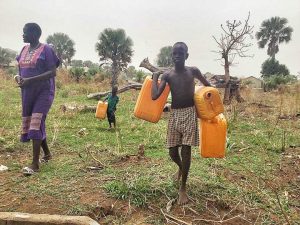
Project Directors
Steve Roese and Bishop Elias Taban
Steve Roese, President of Water is Basic U.S., are an entrepreneur and pastor. Steve has been involved in Sudan and now South Sudan 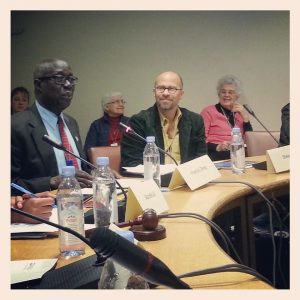 since 2004 where he has fought alongside his brothers and sisters for peace and opportunity. His motto is “whatever it takes,” and he means it when it comes to supporting the local Water is a Basic team in their work of building a nation.
since 2004 where he has fought alongside his brothers and sisters for peace and opportunity. His motto is “whatever it takes,” and he means it when it comes to supporting the local Water is a Basic team in their work of building a nation.
Bishop Elias Taban leads the efforts of Water is Basic South Sudan and co-founded the organization. A former Colonel in the Sudan People’s Liberation Army and founder of the Evangelical Presbyterian Church of South Sudan, Bishop Taban is an engineer, entrepreneur and pastor who is highly respected throughout all circles in South Sudan. He has also founded and run three orphanages, two hospitals, and a trucking company that helps to further fund well development and repairs. Bishop Taban is a tireless leader for solutions that build into the people and infrastructure of South Sudan.
Steve Roese and Bishop Taban have been faithful to this mission for over a decade. Their presence and influence are leading to peace initiatives at the grassroots level. This could not be done without the faithfulness and generosity of their partners and donors.
Monitoring and Maintenance
After receiving detailed requests from public officials listing sites where well repairs are needed, the Water Is Basic staff gathers local people in each village to educate and empower them to form a committee to oversee the repairs. Once repairs are complete, the committee establishes a fee-based collection system for water usage and oversees the well operations.
These committees become a reconciliation tool as mixed genders, tribes and religions work together to manage the community well. By developing a committee, and managing and maintaining their well, the village is able to collect and save money to dedicate to future repairs.
